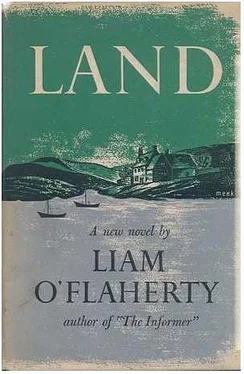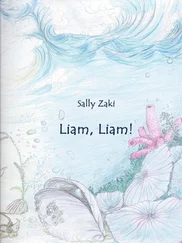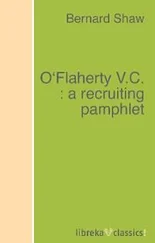Liam O'Flaherty - Land
Здесь есть возможность читать онлайн «Liam O'Flaherty - Land» весь текст электронной книги совершенно бесплатно (целиком полную версию без сокращений). В некоторых случаях можно слушать аудио, скачать через торрент в формате fb2 и присутствует краткое содержание. Город: London, Год выпуска: 2011, ISBN: 2011, Издательство: Bloomsbury Publishing, Жанр: Проза, на английском языке. Описание произведения, (предисловие) а так же отзывы посетителей доступны на портале библиотеки ЛибКат.
- Название:Land
- Автор:
- Издательство:Bloomsbury Publishing
- Жанр:
- Год:2011
- Город:London
- ISBN:9781448203888
- Рейтинг книги:3 / 5. Голосов: 1
-
Избранное:Добавить в избранное
- Отзывы:
-
Ваша оценка:
- 60
- 1
- 2
- 3
- 4
- 5
Land: краткое содержание, описание и аннотация
Предлагаем к чтению аннотацию, описание, краткое содержание или предисловие (зависит от того, что написал сам автор книги «Land»). Если вы не нашли необходимую информацию о книге — напишите в комментариях, мы постараемся отыскать её.
Land — читать онлайн бесплатно полную книгу (весь текст) целиком
Ниже представлен текст книги, разбитый по страницам. Система сохранения места последней прочитанной страницы, позволяет с удобством читать онлайн бесплатно книгу «Land», без необходимости каждый раз заново искать на чём Вы остановились. Поставьте закладку, и сможете в любой момент перейти на страницу, на которой закончили чтение.
Интервал:
Закладка:
“It’s Lettice who is to be congratulated,” Michael said. “It was her handling of the women that …”
“It’s good news that Butcher is obviously beginning to lose his nerve,” Raoul interrupted. “We can now proceed with the final assault on him. The stage is set. However, it would be well for us not to get excited over this minor success at High Valley. Butcher can procure another writ at the next Assizes, three months from now. Judging from the news I have just received, there may be no resistance to his next attempt at evicting the High Valley people.”
Michael got to his feet and said anxiously:
“Is there something wrong?”
Raoul described the attack on Ahearn and the slanders uttered against himself.
“Pay no attention to those people,” Michael said. “They are just a few religious fanatics. They have no influence.”
“You are wrong,” said Raoul. “I have been expecting something like this. The Church is being set against us.”
“It was against us from the beginning,” Michael said. “What of it?”
“This is different,” said Raoul. “Until now, the Church opposed us officially, on moral grounds. Now it is using the weapon of superstitious fear, in an underhand manner. Superstition is the oldest and most effective weapon in the hands of tyranny.”
“I’ll soon deal with that group,” Michael said. “I’ll guarantee they won’t attack anybody else for a long time.”
“What do you propose to do?” said Raoul.
“Leave that to me, sir,” Michael said.
“I forbid you to use force,” said Raoul.
“Why not?” said Michael. “You have told me, again and again, that prevention is always the best cure in war.”
“Force would only make matters worse in this instance,” said Raoul. “Superstition is a deadly germ that must be handled with extreme delicacy. In any case, they have me at a disadvantage. I blundered badly in the case of Father Francis.”
“I know this group of people,” Michael said indignantly. “They are just acting out of spite. It’s not religion that inspires them at all. I’m certain that Father Costigan disapproves of them.”
Raoul shook his head.
“In a free society,” he said, “religion is the poetry of the people. It is the dark ecstasy by means of which even the most lowly confront suffering and death with dignity. It ennobles all the incidents of daily life. Under tyranny, on the other hand, it becomes the monopoly of priestcraft, being tolerated by the ruling power only for the purpose of keeping the oppressed in ignorant awe. In the latter case, religion becomes an evil and mysterious force, to be approached by free men with the utmost caution.”
Elizabeth and Lettice came into the room at that moment, arm in arm. They both looked very excited.
“Raoul,” said Elizabeth, “these young people have something very important to say.”
“What is it now?” said Raoul.
Lettice broke away from Elizabeth and ran over to Michael. She took his hand. He looked at Raoul and blushed deeply.
“What is it all about?” said Raoul, becoming irritated.
“My brother is not really an ogre,” Elizabeth said to Michael. “Don’t be afraid of him.”
“Lettice and I love one another,” Michael said at length to Raoul. “We ask your consent to our marriage.”
Raoul put the tips of his fingers to his beard and sighed with relief.
“Upon my word!” he said. “I thought something dreadful had happened. So you two people love one another and wish to be married. Excellent.”
He bowed to them and added:
“I congratulate you both on being in love.”
Lettice rushed to Raoul, threw her arms about his neck and said:
“Then we have your consent, father?”
“Of course,” said Raoul after he had kissed her affectionately. “With my whole heart. You have chosen a man who is brave and noble of spirit. What more could I ask of you?”
Michael then came and shook hands with Raoul, as Elizabeth again put her arm around Lettice’s waist.
“There is even greater news,” Elizabeth said to her brother. “Lettice has decided to become a Catholic.”
Raoul started. Then he remained silent for a little while, staring at Lettice in wonder.
“Very interesting,” he said at length. “Very interesting indeed.”
He suddenly turned to Elizabeth and cried excitedly:
“You know all about these things, Lizzie. Is it true that converts have to receive certain instruction prior to being accepted into the Catholic Church?”
“Of course,” said Elizabeth.
“Excellent,” said Raoul, staring at the ground and beginning to look really relieved for the first time since he had heard of the attack on Ahearn. “I think this is most extraordinary.”
“What do you mean by that?” said Elizabeth suspiciously.
“It means,” said Raoul, “that I have been given a most unexpected card to play. It could only be Destiny that has given me this card.”
Chapter XXVI
Raoul had to leave his carriage on the road and walk the remaining two miles to Father Kelly’s stone hut, across very difficult country. There was a rough lane for half a mile. It was bound by stone fences and so narrow that he had to walk sideways, in order to avoid having his clothes torn by the briars that grew in profusion along the sides. Then he came to a holy well, over which a mass of tattered rags had been hung by devout people. The lane ended there. He crossed a stile on to a wild slope that rose very steeply to the summit of Manister Head. There was only a faint track winding upwards through granite boulders and clumps of gorse. He fell several times, owing to the short grass being slippery after a long period of dry weather. Such was his eagerness to see Father Francis that he never once paused to take breath before reaching the top of the mountain.
The hut was in the centre of a flat space, that reached out from the edge of the cliffs for about two hundred yards. The sea lay more than six hundred feet below. A flock of sea birds had been dozing on the cliff top when Raoul appeared. They rose into the air, making a great cackle. Disturbed by the sound, Father Francis came to the door of his hut and looked around him. He started on catching sight of Raoul. Then he rushed back into the hut again without saying a word.
Raoul advanced at a leisurely pace across the open space. He was dressed in a belted tweed jacket, cord knee breeches, worsted stockings, half boots and a peaked cap. This was more or less the costume worn by country gentlemen when out shooting. Yet it made him look even more outlandish than did his buckled shoes and his black cloak. The truth is, of course, that individuals of arresting personality look most “different” when they try to look commonplace.
The cone-shaped hut was twelve feet high and thirty feet in circumference at the base. The wall was remarkably well preserved, considering that it was more than two thousand years old and made with uncut stones that did not fit very well. There was neither window nor chimney. The door was five feet high and narrowed slightly towards the top. A fairly large man could pass without touching its sides.
“Come no farther,” the priest said from within the hut when Raoul approached, “until you tell me what brought you here.”
Raoul halted and said:
“I came to ask a favour.”
“In that case,” said Father Francis, “you may go at once. I won’t grant your favour.”
“You must at least allow me to tell you what it is,” said Raoul.
“They brought me news of Bodkin’s death yesterday,” said the priest.
“The favour I came to ask,” said Raoul, “concerns others. I ask nothing for myself.”
“My first impression was right,” said the priest. “You are an evil man.”
Читать дальшеИнтервал:
Закладка:
Похожие книги на «Land»
Представляем Вашему вниманию похожие книги на «Land» списком для выбора. Мы отобрали схожую по названию и смыслу литературу в надежде предоставить читателям больше вариантов отыскать новые, интересные, ещё непрочитанные произведения.
Обсуждение, отзывы о книге «Land» и просто собственные мнения читателей. Оставьте ваши комментарии, напишите, что Вы думаете о произведении, его смысле или главных героях. Укажите что конкретно понравилось, а что нет, и почему Вы так считаете.












